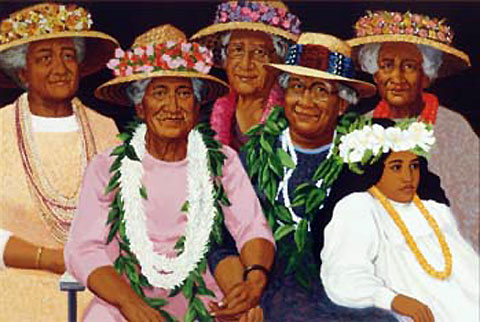by Juan Wilson & Linda Pascatore
22 March 2007 - La 'iwaka-lua-kuma-lua o Malaki, 'Elua Kaukani me 'Ehiku
This
series is derived from adult education classes in conversational
Hawaiian given by the Kauai District of Education at Waimea High School
by Kumu (teacher) Kamakua Kahale. She is a young Niihauan who speaks
fluent Hawaiian. The spring classes are now over, so this lesson is
uncorrected by our kumu.
See the introduction article for conventions we are using relating punctuation and spelling: Island Breath: Hawaiian Language Intro
In
class #4 we examined some basic Questions and Answers. We will do some
more with Q&A but first some more vocabulary; the focus is family.
VOCABULARY
Family Relations (ohana)
ohana = family
kane = man, male
wa-hine = woman, female
makua-kane = father (mature man)
makua-hine = mother (mature woman)
keiki = child, youth
keiki kane = boy
kama kane = son
kama-hine = daughter, girl
kai = sibling
kai-kuahine = male's sister or cousin
kai-kunane = female's brother or cousin
kai-kaina = younger sibling (cousin) of same sex
kai-kuaana = older sibling (cousin) of same sex
Note: the "kai" is frequently dropped from these terms when used as address
kuku-kane = familiar grandfather
kuku-hine = familiar grandmother
kupuna = elder person, respected person
kupuna-kane = respected grandfather
kupuna-hine = respected grandmother
elemakule = elderly man
lua-hine = elderly woman (lua can mean shabby)
mo-opuna = grandchild
kua kahi = 1st born grandchild
kua lua = 2nd born grandchild
kua kolu = 3rd grandchild
anakala = uncle (for older man or if name unknown)
anake = aunt (for older woman or if name unknown)
a kou kai-kua-ana = son of my older brother, or nephew
kau kai kama hine = my daughter
ke kai kama hine = someone else’s daughter
hoa hanau = cousin (hoa--person or partner, hanau--born)
hiapo = youngest child
opio = teenager
hanai = adopted (hanai--literally to feed)
We
will now learn how to ask some simple questions about people and return
simple answers. Read previous articles for a reminder of prounouns.
Here is a very short list of vocabulary followed by a refresher on
asking questions about people.
VOCABULARY
kou = your (cow)
ko’u = mine (ko-ooh)
inoa = name
noho = to dwell, live
wahi = place, location
wai = who
Note: questions and answers about "who" usually use the address form prefix O'
QUESTION:
O' wai kou anakala?
Oh, who (is) your uncle?
ANSWER:
O’ John ko'u anakala.
John (is) my uncle.
QUESTION:
O' Sue ka inoa o kou kukuhine?
(Is) Sue the name of your grandmother?
ANSWER:
Aole, Linda ko'u kukuhine.
No, Linda (is) my grandmother.
QUESTION:
E, Lucy, o' wai ka inoa o kou makuakane?
Hey, Lucy, who (is) the name of your father?
ANSWER:
O' Ben ka inoa o ko'u makuakane?
Ben (is) the name of my father.
e'hia = quantity
QUESTION:
'E hia ou keikikane?
How many you boys? (How many boys do you have?)
ANSWER:
'E, e'kolu o'u keikikane.
Hey, three are my boys. (I have three boys.)
'i hea = where
QUESTION:
'I hea kou wahi noho?
Where is your place to dwell?
ANSWER:
Noho au ma Hanapepe.
Dwell I in Hanapepe. (I live in Hanapepe)
Hawaiian Online Dictionary http://www.wehewehe.org
"Spoken Hawaiian" by Samuel H. Elbert available on www.Amazon.com |

